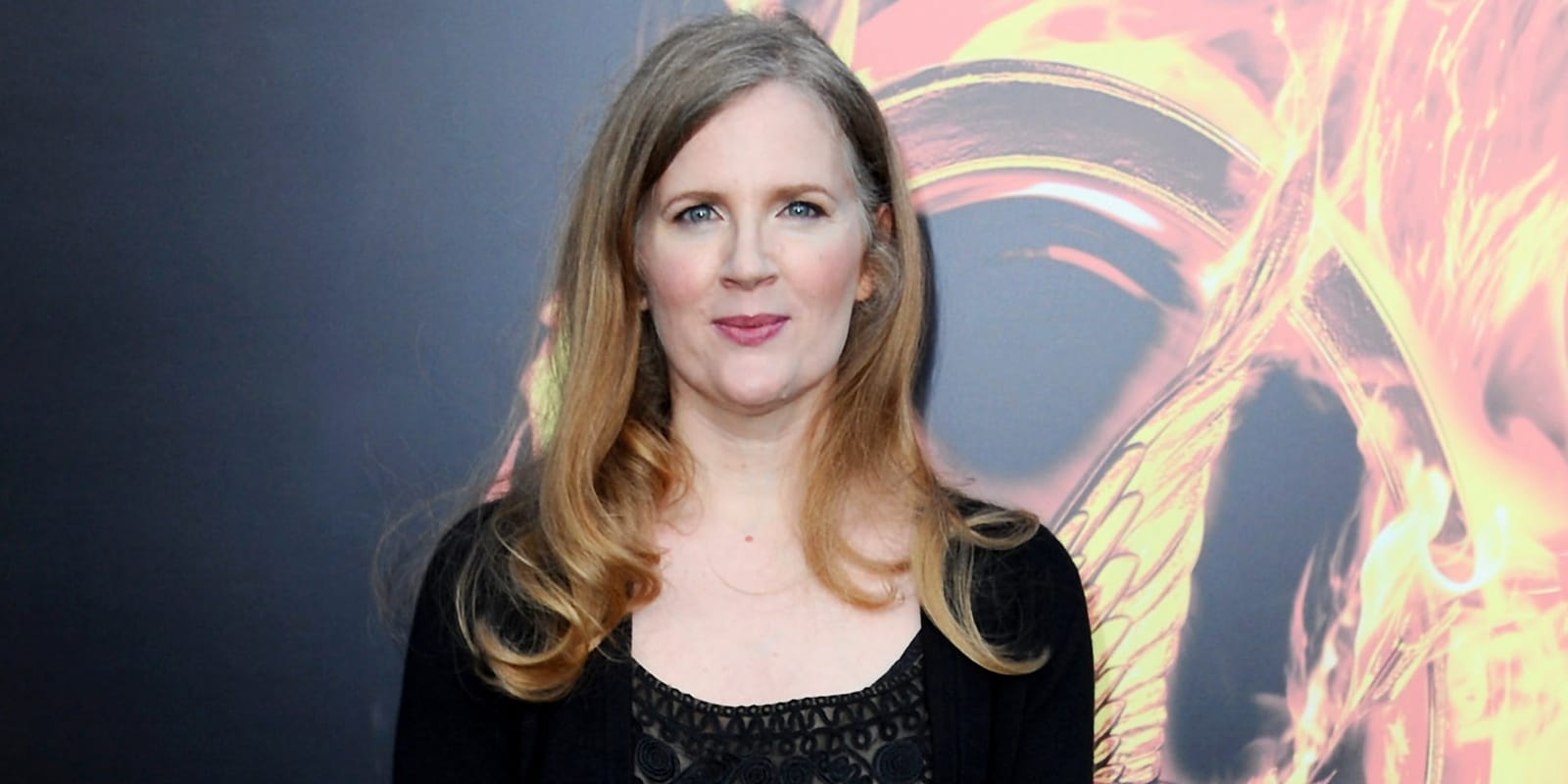Have you ever wondered about the financial story behind the author of one of the most impactful book series of our time? Many people, it seems, are quite curious about Suzanne Collins net worth. It's a topic that, you know, often sparks conversation, especially when we consider the sheer scale of her literary achievements. Her work has truly captured the hearts and minds of readers across the globe, leading to immense commercial success, and so, it makes sense that people want to know about her wealth.
While the information we have, for instance, talks about the delicious world of pizza, from Beijing's best spots to the most expensive slice ever sold, and even touches on the moving song "Suzanne" by Leonard Cohen, which Judy Collins helped make famous, it doesn't, however, share details about the financial standing of Suzanne Collins, the celebrated author we are here to talk about. This article will, basically, focus on her impressive journey and the wealth she has, quite rightly, accumulated.
Suzanne Collins has, in a way, built a remarkable fortune through her creative genius. Her books have not only entertained millions but have also translated into a significant financial empire. We'll explore the path she took to become such a successful author and, you know, how her financial picture came to be what it is today.
Table of Contents
- Suzanne Collins: A Brief Life Story
- Personal Details and Background
- Early Career and Television Work
- The Hunger Games Phenomenon and Its Financial Impact
- Sources of Her Wealth
- Estimating Suzanne Collins' Net Worth
- Impact and Legacy Beyond Money
- Her Financial Journey Through Time
- Frequently Asked Questions About Suzanne Collins' Net Worth
Suzanne Collins: A Brief Life Story
Suzanne Collins was born on August 10, 1962, in Hartford, Connecticut. Her father was an Air Force officer, and this meant her family moved around a lot. This experience of moving and seeing different places, you know, might have influenced her storytelling later on. She spent her childhood in various parts of the eastern United States, and this constant change, in some respects, could have given her a broad perspective on life and people.
She eventually graduated from the Alabama School of Fine Arts in 1980, with a focus on theater arts. Later, she went on to Indiana University Bloomington, earning a bachelor of arts degree in 1985, with a double major in theater and telecommunications. Then, she got a master of fine arts degree in dramatic writing from New York University in 1989. These academic pursuits, basically, laid the groundwork for her future writing career, giving her tools for crafting stories and characters.
Before she became a famous novelist, Suzanne Collins worked in television. She wrote for children's shows, which is, you know, a pretty different kind of writing than what she's known for now. This work gave her experience in creating narratives and engaging young audiences. It was a time of learning, and it probably helped her develop her storytelling skills, even if the topics were, you know, quite different.
Personal Details and Background
Here is a quick look at some personal details about Suzanne Collins. This table, basically, gives a snapshot of her background and some key facts about her life. It helps to, you know, put a face to the name and understand a bit more about the person behind the hugely popular books.
| Full Name | Suzanne Marie Collins |
| Date of Birth | August 10, 1962 |
| Place of Birth | Hartford, Connecticut, USA |
| Nationality | American |
| Occupation | Novelist, Screenwriter |
| Known For | The Hunger Games series, The Underland Chronicles |
| Spouse | Charles Pryor (married 1992) |
| Children | 2 |
Early Career and Television Work
Suzanne Collins began her writing career in 1991, primarily working on children's television shows. She wrote for several popular programs on Nickelodeon, including "Clarissa Explains It All," "The Mystery Files of Shelby Woo," and "Little Bear." These roles, you know, gave her a solid foundation in crafting stories for a young audience. She learned about pacing, character development, and how to keep viewers interested, which are skills that, basically, translated well into her later book writing.
Her experience in television writing, you know, helped her understand how to build a narrative arc. It taught her how to create compelling plots and memorable characters. This background in screenwriting is, in fact, quite evident in her novels, which often have a very visual and fast-paced quality. It's almost like she was already thinking about how her stories would look on screen, even when she was just writing them down.
Her first book series for younger readers was "The Underland Chronicles," which started with "Gregor the Overlander" in 2003. This series, basically, gained a following and showed her talent for creating imaginative worlds and engaging adventures. It was, in a way, a stepping stone to her later, much bigger success. This early work, you know, really set the stage for what was to come.
The Hunger Games Phenomenon and Its Financial Impact
The real turning point for Suzanne Collins' financial success came with "The Hunger Games" series. The first book was published in 2008, and it, basically, became an instant hit. The story of Katniss Everdeen, a young woman fighting for survival in a dystopian world, resonated with millions of readers. This book, you know, quickly topped bestseller lists and started a cultural phenomenon. It was, quite honestly, a huge moment for young adult literature.
The series continued with "Catching Fire" in 2009 and "Mockingjay" in 2010. Each book, you know, built on the success of the last, drawing in more and more readers. The themes of survival, rebellion, and social commentary really struck a chord. The books sold, basically, tens of millions of copies worldwide. This kind of sales volume, you know, generates a significant amount of money for an author.
Then came the film adaptations. The movies, you know, brought the stories to an even wider audience. The first "Hunger Games" movie was released in 2012, and it was a massive box office success. Subsequent films, like "Catching Fire," "Mockingjay – Part 1," and "Mockingjay – Part 2," also earned hundreds of millions of dollars globally. These films, basically, amplified the books' popularity and, in turn, boosted Suzanne Collins' earnings considerably. The movie deals, you know, are a major part of her financial story.
The success wasn't just limited to books and movies. There was, you know, a whole range of merchandise, video games, and other related products. These spin-offs, in some respects, added to the overall revenue generated by the franchise. Every new movie release or book anniversary, like the recent buzz around "The Ballad of Songbirds and Snakes" in 2023 and 2024, you know, tends to bring renewed interest and, basically, more income streams for the author. It's a continuous cycle of success.
Sources of Her Wealth
Suzanne Collins' wealth comes from several key areas. The most obvious, basically, is book sales. She earns royalties from every copy of her books sold, both in print and digital formats. Given the tens of millions of copies sold globally, this alone accounts for a very large portion of her income. Her books are published in many languages, too, which means she earns royalties from international sales as well. This is, you know, a pretty steady source of money.
Another major source is the film rights. When a book series as popular as "The Hunger Games" gets turned into movies, the author usually receives a significant upfront payment for the rights. Beyond that, she also typically earns ongoing royalties from the box office success of the films. These deals, you know, can be incredibly lucrative, especially for a franchise that has earned billions of dollars worldwide. It's a bit like, you know, having a piece of every ticket sold.
Then there are other media rights. This includes things like television rights, streaming rights, and even potential stage adaptations. While not as prominent as the main film deals, these can still add, you know, a fair bit to her overall earnings. Every time the stories are adapted into a new format, she, basically, stands to gain financially.
Merchandise and licensing agreements also contribute. Think about all the "Hunger Games" branded items, from clothing to games. Suzanne Collins, you know, would likely receive a percentage from the sales of these licensed products. This passive income stream, basically, continues to generate money long after the initial book and movie releases. It's, you know, a way for her stories to keep earning money in different forms.
Finally, there's the income from new books. With the release of "The Ballad of Songbirds and Snakes," a prequel to "The Hunger Games," she has, you know, added another significant income stream. This new book, and its subsequent film adaptation, basically, ensure that her financial success continues into the future. It shows that, you know, her creative output is still very much in demand, and that's a good thing for her net worth.
Estimating Suzanne Collins' Net Worth
Pinpointing an exact figure for Suzanne Collins net worth is, you know, quite challenging. Wealth estimates for public figures are often, basically, just educated guesses. They depend on various factors like book sales, film deals, and investments, many of which are not publicly disclosed. However, various financial publications and celebrity wealth trackers have, in fact, offered estimates over the years.
These estimates typically place her net worth in the range of hundreds of millions of dollars. Some reports, you know, have suggested figures upwards of $100 million or even higher. It's a very substantial amount, reflecting the immense global success of "The Hunger Games" franchise. To put it simply, her earnings from the books alone, considering the sheer volume sold, would be, you know, quite considerable.
The film adaptations, basically, played a huge part in boosting her wealth. Authors often negotiate deals that include both upfront payments and a percentage of the film's gross earnings. With the "Hunger Games" movies collectively earning billions at the box office, her share from these deals would be, you know, truly significant. This is where a large chunk of her estimated net worth likely comes from.
It's important to remember that these figures are, you know, estimates. They don't account for personal expenses, taxes, or any charitable contributions she might have made. Still, the consensus among those who track celebrity wealth is that Suzanne Collins is, basically, one of the wealthiest authors in the world. Her financial standing is, you know, a direct result of her creative vision and the incredible popularity of her stories.
As of mid-2024, the continued popularity of her books and the success of the prequel, "The Ballad of Songbirds and Snakes," and its film version, mean her financial position remains, you know, very strong. Her work continues to generate interest and, basically, revenue, keeping her name prominent in discussions about successful authors and their earnings. It's a testament to the lasting power of her storytelling, really.
Impact and Legacy Beyond Money
While discussing Suzanne Collins net worth is interesting, it's also, you know, important to look at her impact beyond just money. Her "Hunger Games" series has had a profound influence on young adult literature. It helped to, basically, popularize the dystopian genre and inspired countless other authors. Many writers, you know, have tried to capture the same kind of gripping narrative and social commentary that she achieved.
The books also sparked important conversations among readers, especially young people. They explored complex themes like war, poverty, media manipulation, and the power of individual choice. These discussions, you know, went beyond just entertainment, making readers think about real-world issues. Her stories, in a way, encouraged critical thinking and empathy, which is, you know, pretty powerful for a book series.
Suzanne Collins has, basically, also used her platform for good. She has supported various causes, though she tends to be quite private about her philanthropic efforts. This commitment to giving back, you know, shows that her influence extends beyond just financial gains. She cares about the world, and that's, you know, a truly admirable quality.
Her legacy is, in fact, not just about the money she has earned, but about the stories she has told and the impact those stories have had on culture and on individual readers. She created characters that, you know, resonated deeply, and a world that felt both fantastical and, in some respects, eerily real. This kind of lasting impression, basically, goes far beyond any monetary figure.
The continued relevance of her work, even years after the original books were published, is a strong indicator of her lasting legacy. New generations of readers are discovering "The Hunger Games," and the themes remain, you know, very pertinent. This enduring appeal means her stories will, basically, continue to shape conversations and entertain for a long time to come. Learn more about Suzanne Collins on our site, and link to this page Discover more about successful authors here.
Her Financial Journey Through Time
Suzanne Collins' financial journey, you know, really began to accelerate with the publication of "The Hunger Games" in 2008. Before that, her income was, basically, from her television writing and her earlier book series, "The Underland Chronicles." These early endeavors provided a steady income, but they didn't, you know, generate the kind of massive wealth she later achieved. It was a gradual build-up, really.
The period from 2008 to 2010, when the original "Hunger Games" trilogy was released, saw a significant increase in her earnings. Book sales were, you know, booming, and she was receiving substantial royalties. This was the initial wave of her financial success, and it, basically, set the stage for what was to follow. It was a very exciting time for her, financially speaking.
Then, the release of the first "Hunger Games" movie in 2012 marked another huge leap in her net worth. The film deals, you know, brought in massive sums of money. Each subsequent movie release, up to "Mockingjay – Part 2" in 2015, added, basically, more to her financial portfolio. This was the period when her net worth likely reached its highest public estimates, fueled by the global box office success. It was, you know, a truly remarkable period of growth.
Even after the initial movie series concluded, her wealth continued to grow from ongoing book sales, licensing, and, you know, streaming rights. The franchise remained popular, ensuring a consistent flow of passive income. It's not just a one-time thing; the money keeps coming in, basically, because the stories are still loved and consumed in various forms. This steady stream of income, you know, helps maintain her wealth.
The release of "The Ballad of Songbirds and Snakes" in 2020, and its film adaptation in 2023, basically, reignited interest in the franchise and added new revenue streams. This shows that her creative output continues to be highly valued, and that's, you know, very good for her financial standing. Her journey is a clear example of how a compelling story can, in fact, create lasting financial success for its creator.
Frequently Asked Questions About Suzanne Collins' Net Worth
How much money did Suzanne Collins make from the Hunger Games books?
Suzanne Collins earned a very significant amount from the sales of "The Hunger Games" books. While specific royalty percentages are not public, authors typically receive a percentage of each book sold. With tens of millions of copies sold worldwide, her earnings from book royalties alone would be, you know, in the tens of millions of dollars, if not more. It's a substantial sum, basically, reflecting the immense popularity of the series.
<


Detail Author:
- Name : Oliver Hoeger
- Username : moore.dave
- Email : [email protected]
- Birthdate : 1994-04-26
- Address : 353 Obie Glens Suite 056 Taliaberg, UT 20124-0627
- Phone : (678) 862-1996
- Company : Krajcik-Witting
- Job : Decorator
- Bio : Sit et vel accusamus. Eligendi quasi repellat aut magni. Non molestiae voluptatem voluptatem quod repellat fugiat. Voluptatem doloremque quis sit aut earum et. Aut iste est distinctio mollitia.
Socials
tiktok:
- url : https://tiktok.com/@weston_xx
- username : weston_xx
- bio : Ducimus sequi nisi animi est libero suscipit iusto.
- followers : 5280
- following : 673
facebook:
- url : https://facebook.com/wkerluke
- username : wkerluke
- bio : Beatae molestiae qui ut laudantium sint.
- followers : 498
- following : 1607
twitter:
- url : https://twitter.com/westonkerluke
- username : westonkerluke
- bio : Quaerat rem rerum incidunt repellat odio earum ullam natus. Quos sunt voluptatem ex est molestiae culpa incidunt. Non repellat dolor autem est non dicta.
- followers : 5184
- following : 2966